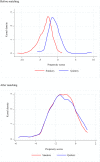Does smoking cessation result in improved mental health? A comparison of regression modelling and propensity score matching
- PMID: 26490099
- PMCID: PMC4620166
- DOI: 10.1136/bmjopen-2015-008774
Does smoking cessation result in improved mental health? A comparison of regression modelling and propensity score matching
Abstract
Objectives: Smokers report that smoking is therapeutic; a recent meta-analysis suggests the contrary. However, the association in that review may be explained by group-membership bias and confounding. Propensity score matching (PSM) aims to produce causal estimates from observational data. We examined the association between cessation and change in mental health before and after PSM.
Design: A secondary analysis of prospective data from 5 placebo-controlled randomised trials for smoking reduction.
Participants: All participants were adult smokers and had smoked for at least 3 years. Participants were excluded if they were pregnant, breast feeding, under psychiatric care, deemed to be unfit by a general practitioner or part of a cessation programme. In total, 937 participants provided smoking data at both 6-month and 12-month follow-ups. Of these, 68 were confirmed as abstinent at both 6 and 12 months and 589 as continuous smokers at both follow-ups.
Primary outcome: Change in mental health (36-item Short Form Survey (SF-36), scored 0-100) from baseline (while all participants were smokers) to 12-month follow-up (after cessation) was compared between quitters and continuing smokers with and without adjustment, and after PSM.
Results: Before matching, quitters' mental health scores improved compared with continuing smokers', the mean difference and 95% CI was 5.5 (1.6 to 9.4). After adjustment, the difference was 4.5 (0.6 to 8.5), and after PSM, the difference was 3.4 (-2.2 to 8.9).
Conclusions: Improvements in mental health after smoking cessation may be partly but not completely explained by group membership bias and confounding.
Keywords: EPIDEMIOLOGY; MENTAL HEALTH; PRIMARY CARE; PUBLIC HEALTH; SMOKING AND TOBACCO.
Published by the BMJ Publishing Group Limited. For permission to use (where not already granted under a licence) please go to http://group.bmj.com/group/rights-licensing/permissions.
Figures
References
-
- Lader D. Opinions survey report number 40: smoking related behaviour and attitudes 2008 to 2009. London, UK, 2009.
-
- Centers for Disease Control and Prevention (CDC). Quitting smoking among adults—United States, 2001–2010. MMWR Morb Mortal Wkly Rep 2011;60:1513–19. - PubMed
-
- Kerr S, Watson H, Tolson D et al. . Smoking after the age of 65 years: a qualitative exploration of older current and former smokers’ views on smoking, stopping smoking, and smoking cessation resources and services. Health Soc Care Community 2006;14:572–82. 10.1111/j.1365-2524.2006.00659.x - DOI - PubMed
Publication types
MeSH terms
Grants and funding
LinkOut - more resources
Full Text Sources
Other Literature Sources
Medical
Miscellaneous



